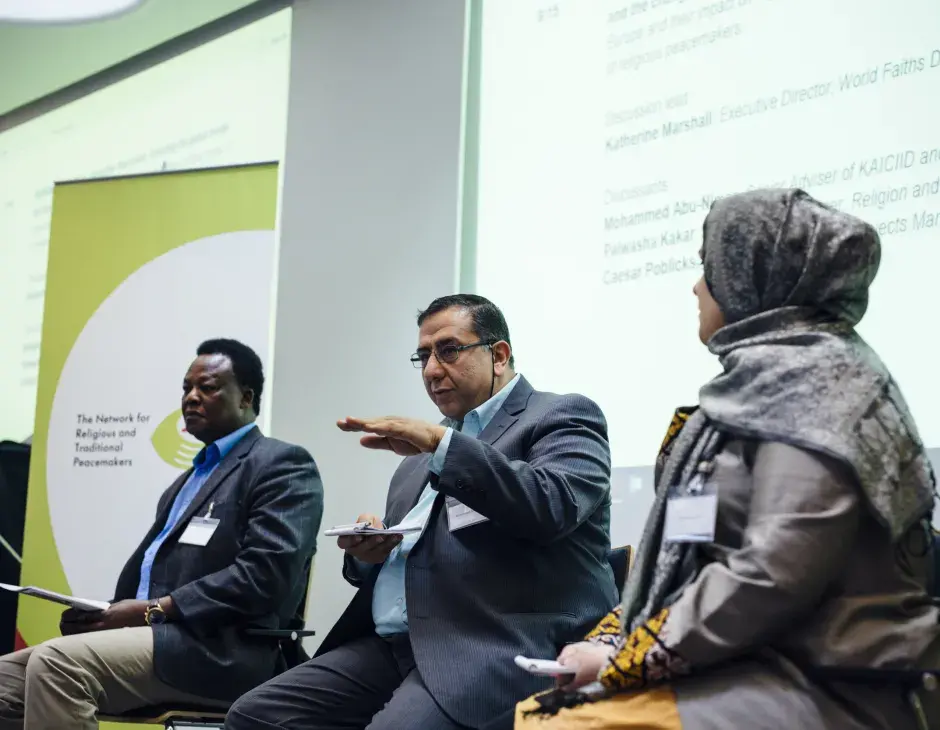The third National Dialogue Conference brought together experts, practitioners and officials from the field of peacebuilding and national dialogues on 5 April to continue discussion on their work and to network among their colleagues and future collaborators in the field. Organized by the Ministry for Foreign Affairs of Finland in cooperation with the Crisis Management Initiative, Felm, Finn Church Aid and the Common Space Initiative. The conference focused on several contexts, three of which are KAICIID focus countries, Myanmar, Central African Republic and Syria. KAICIID Senior Adviser, Professor Mohammed Abu-Nimer, attended the conference and spoke on a panel sharing his insights on the involvement of youth in national dialogues.
“There is a necessity to include the youth issues and needs into the national dialogue process, but the question is how, and is representation the only mechanism to effectively bring the youth to the national dialogue process?” he said. “We certainly need more mechanisms beyond representation to engage youth in any national dialogue process.”
The roundtable discussion explored cases and examples of challenges, and accomplishments of engaging youth from Myanmar, Central African Republic and Arab countries. A common lesson emerged as participants and speakers pointed out the need to break the merely symbolic use of youth voices in national peace processes.
By providing a space for joint reflection and discussion on dialogue in different contexts, the National Dialogue conferences have included a diverse milieu of practitioners and academics whose lively debates have deepened the understanding of national dialogue processes through collaborative lessons to support and educate stakeholders and practitioners.
The Conference was followed by the working meeting of the Advisory Group of the Network for Religious and Traditional Peacemakers, of which KAICIID is a core member. The Advisory Group meeting was attended by KAICIID Director General, Fahad Abualnasr and Prof. Abu-Nimer, and provided a space for further conversation on the National Dialogue Conference, focusing on member experiences. It invited Network members to share strategic thinking and planning how to work together to respond to conflict, share best practices, advance strategic discussions, share activities and collect feedback to improve the functioning of the Network in support of its members.
“We value the Network, as KAICIID works through an inclusive philosophy that centers on its cooperation with like-minded advocates for peace and interreligious harmony,” Abualnasr said. “We are actively committed to supporting this initiative through working together with the Network on projects to help mitigate conflict through dialogue, which involves and includes the affected religious communities.”
National Dialogues
Over the past three decades, national dialogues have become increasingly common worldwide as a mechanism for conflict resolution and peacebuilding. These dialogues have come in all kinds of different shapes and sizes, with varying aims and intentions – to expand political participation, generate new approaches and solutions or manage change at delicate times. This inherent diversity notwithstanding, broad interest has emerged in the potential of national dialogues as a powerful approach in prevention, resolution and transformation of conflicts.
About the Network for Religious and Traditional Peacemakers
The Network for Religious and Traditional Peacemakers was established in January 2013 by the initiative of United Nations Mediation Support Unit (MSU) to encourage entities that work with these peacemakers to increase their cooperation, develop together better mechanisms for support and provide advice for United Nations entities when suitable.
The main structure of the Network is the Advisory Group, consisting of key organizations implementing programmes that support religious and traditional peacemakers. The Advisory Group meets annually and takes increasing ownership of steering the Network and ensuring that its functions are helpful for their programmes and joint activities.

